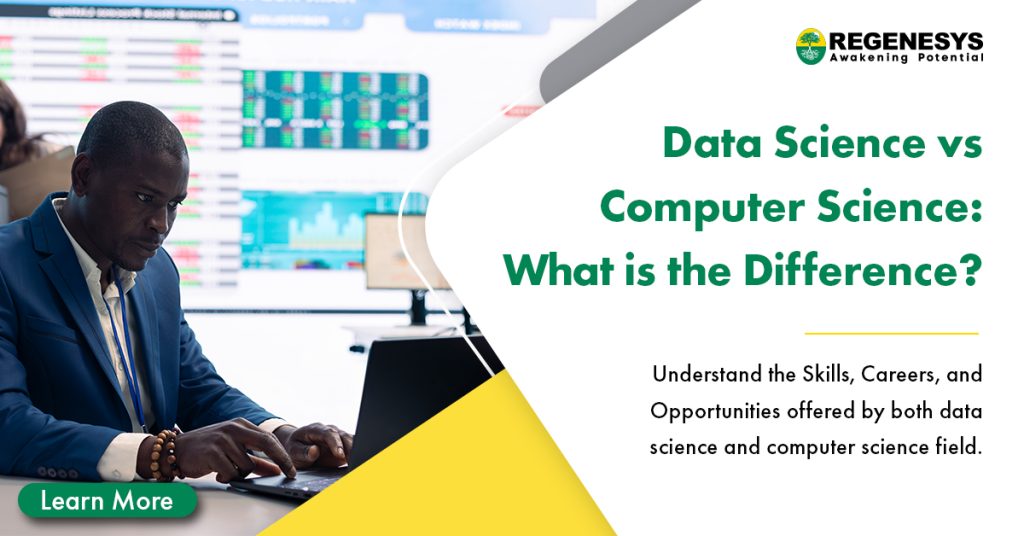From the latest iPhone models to powerful AI systems like ChatGPT, it is clear to us that technology influences every part of our lives. As a result, the demand for tech professionals continues to rise. Two of the most prominent fields driving this technological progress are Data Science and Computer Science. Both these fields are important to the development of innovative solutions and advancements in technology.
Although these fields often overlap, each has its own set of opportunities and challenges. If you are trying to choose between them, it is important to understand their key differences.
In this article, we will explore more on Data Science vs Computer Science, helping you make a well-informed decision about your future career. We will also discuss the career paths, qualifications and skills required for both these fields.
Table of Contents
- What is Data Science?
- What is Computer Science?
- Differences Between Data Science and Computer Science
- Similarities Between Data Science and Computer Science
- Applications of Data Science and Computer Science
- Data Science Vs Computer Science: Career Pathways and Job Roles
- Education and Skills Required For Data Science and Computer Science
- Data Science vs Computer Science – Which Field You Should Choose?
- Conclusion
- Data Science vs Computer Science – FAQs
What is Data Science?
Data science is a field that blends Mathematics, Statistics, Programming, And Machine Learning to analyse vast amounts of data and identify hidden patterns. By applying advanced analytics and AI techniques, data scientists transform raw data into valuable insights that guide business decisions and strategic planning.
Moreover, data science involves interpreting diverse data sources, thus helping organisations make informed decisions, innovate, and stay competitive. As you explore the Data Science vs Computer Science landscape, it is clear that data science stands out for its focus on extracting actionable insights from complex datasets.
What is Computer Science?
Computer science is the study of computers and computational systems. It involves creating and improving software, designing algorithms, and understanding how computer systems work. this field covers a range of topics, including Algorithms, Programming Languages, Software Engineering, And Artificial Intelligence.
The professionals in this field work on everything from developing new software and apps to solving complex problems with technology. Hence, in the discussion on Data Science vs Computer Science, we can say that computer science focuses on the technical aspects of software and systems.
To know more about What is computer science, read our article here.
Differences Between Data Science and Computer Science
When deciding between Data Science vs Computer Science, it is important to understand the distinct aspects of each field. The table below highlights the differences between Data Science and Computer Science, offering a clear comparison to help you make an informed decision.
| Aspects | Data Science | Computer Science |
| Core Focus and Objectives | Extracting knowledge and insights from data to make informed decisions. | Understanding how computer systems work, including hardware, software, and algorithms. |
| Areas and Specialisations | Machine learning, data mining, big data analytics, predictive modelling. | Software development, computer systems and networks, algorithms, database systems, and computer architecture. |
| Tools and Technologies | Python (pandas, NumPy, Matplotlib), R, SQL, Tableau, Apache Hadoop. | Java, C++, C#, Git, Docker, Kubernetes. |
| Impact and Applications | Direct impact on decision-making processes, leading to improved strategic decisions, customer experiences, and product development. | Influences technology development and improvement, creating software for devices, networks, and systems, shaping the digital infrastructure. |
Similarities Between Data Science and Computer Science
Despite their differences, Data Science and Computer Science share several similarities that make them closely related fields within the tech industry. In the debate of Data Science vs Computer Science, understanding these common aspects can provide insight into how professionals from both fields collaborate and transition between roles:
- Understanding Business Domain: Both fields require a deep understanding of the business domain to ensure that their solutions align with organisational objectives.
- Programming Skills: Proficiency in at least one programming language is essential for coding and problem-solving in both disciplines.
- Knowledge of Data: Since data is central to tasks like analysis in Data Science and software development in Computer Science, both require working knowledge of the company’s data.
- Git/GitHub Use: Both roles commonly use Git or GitHub for version control and collaboration on complex projects.

Applications of Data Science and Computer Science
As we are discussing Data Science vs Computer Science, understanding the specific application of each field and where they overlap is essential. This is because it will provide valuable insights into their roles. So, let us take a look into the applications of both the fields:
- Data Science Applications: Data Science is used to analyse large datasets and discover patterns to drive strategic business decisions. Common applications include predictive analytics, customer behaviour analysis, and personalised marketing strategies.
- Computer Science Applications: Computer Science focuses on the development of software, systems, and algorithms. Its applications range from creating user-friendly applications and secure networks to optimising computer systems.
- Overlap in Applications: Both fields overlap in artificial intelligence and machine learning, where Data Science and Computer Science work together to develop systems that learn from data and make decisions.
Data Science Vs Computer Science: Career Pathways and Job Roles
When comparing Data Science vs Computer Science, understanding the distinct career pathways and job roles in each field is crucial. By exploring these career options, you can better find your way through your choices and align your career goals with your interests and skills. So here are the top job roles of both data science and computer science:
- Data Science Roles:The following are the job roles you find in the data science field:
- Data Analyst: They interpret and analyse data to provide actionable insights and support decision-making processes.
- Data Scientist: They develop advanced models and algorithms to predict trends and discover hidden patterns in complex datasets.
- Data Engineer: These professionals design and maintain data pipelines and systems, ensuring efficient data storage, processing, and accessibility.
- Business Intelligence Analyst: They use data to generate reports and insights that inform strategic business decisions and improve organisational performance.
- Computer Science Roles: Here are the career roles you can choose to go for in the computer science field, especially when you are considering Data Science vs Computer Science:
- Software developers: They use their programming skills to create and refine applications and systems, ranging from mobile apps to operating systems.
- System Architects: They design and oversee an organisation’s technical frameworks and standards, ensuring systems and applications meet client needs.
- Network Engineer: They manage and optimise an organisation’s computer networks, ensuring reliable and secure data transmission and connectivity.
- AI Researcher: These professionals use artificial intelligence models to create systems that can learn and make intelligent decisions.
Education and Skills Required For Data Science and Computer Science
As you consider a Data Science vs Computer Science major for your professional journey, understanding each field’s educational requirements and essential skills is important. Here’s a quick look at the qualifications and skills needed for success in Data Science and Computer Science.
Data Science: Given below are the educational pathways and skills you may require to excel in the data science field:
- A degree in a quantitative discipline such as Physics, Mathematics, Statistics, Finance, Economics, or Computer Science.
- A Postgraduate Diploma in Data Science to get advanced training in data analysis, statistical methods, and machine learning techniques.
- Essential skills for Data Science include statistical analysis, programming in Python and R, data wrangling and machine learning model development.
Computer Science: Here’s an overview of the essential educational qualifications and skills you need to succeed in the field of Computer Science:
- A bachelor’s degree in Computer Science, like a BSc in Computer Science, to gain foundational knowledge and advanced coursework in principles, algorithms, and programming.
- A master’s degree in Computer Science for advanced research and specialised knowledge, typically involving a thesis or dissertation.
- Proficiency in understanding data structures, algorithms, software engineering principles, computer architecture, and operating systems.
Explore the high school subjects required for computer science
Data Science vs Computer Science – Which Field You Should Choose?
Both Data Science and Computer Science offer exciting career opportunities and growth potential. When considering Data Science vs Computer Science, Data Science is ideal for those who thrive on working with data to uncover insights and drive decisions. In contrast, Computer Science suits individuals passionate about developing software, understanding computer systems, and tackling complex computational challenges.
While Computer Science offers a broad range of career options, Data Science provides a focused path for those dedicated to analysing and interpreting data. However, when you choose between data science and computer science, your choice must align with your strengths and career goals.
Conclusion
As we conclude, it is clear that choosing between Data Science vs Computer Science depends on your interests and career goals. Data Science is perfect for those who enjoy analysing data to uncover insights and influence decisions, while Computer Science suits individuals passionate about software development, system design, and problem-solving. Both fields offer unique opportunities and require distinct skill sets. By understanding their core differences and career prospects, you can make an informed choice that aligns with your strengths and aspirations. We hope our article has provided you with the insights necessary to decide between Data Science and Computer Science.
Discover new opportunities with Regenesys School of Technology. Apply now to shape your future!
Data Science vs Computer Science – FAQs
What are the main differences between Data Science and Computer Science?
Data Science focuses on analysing data for insights using techniques like machine learning. Computer Science is about developing software and understanding computer systems.
What are the top career opportunities in Data Science and Computer Science?
In Data Science, career opportunities include Data Analyst, Data Scientist, Data Engineer, and Business Intelligence Analyst. In Computer Science, the top roles include Software Developer, System Architect, Network Engineer, and AI Researcher.
How do Data Science and Computer Science intersect in the tech industry?
While discussing Data Science vs Computer Science, you must know how they intersect in areas such as artificial intelligence and machine learning. Both fields collaborate to develop systems that can analyse data and make informed decisions.
How does Cloud Computing compare to Data Science?
Cloud Computing vs Data Science involves different focuses. Cloud Computing is about delivering computing services over the internet, whereas Data Science is centred on analysing data to extract insights and support decision-making.
What are the salary differences between Data Science and Computer Science?
When comparing Computer Science vs Data Science salary, both fields offer competitive compensation. The average salary of a data scientist in South Africa is R774 275 per year. On the other hand, the average salary of a computer scientist is R390 000 per year.





